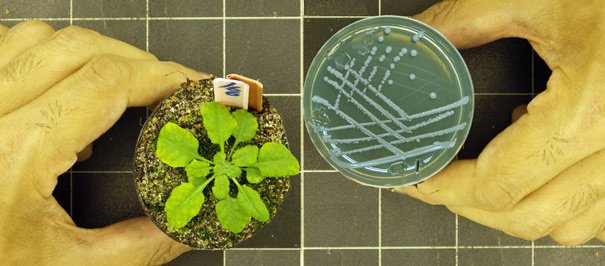Utrecht, Netherlands
September 16, 2020
>> Utrechtse wetenschappers ontdekken versnelde technologie om planten te verbeteren
Utrecht scientists demonstrates a new, non-GMO technology to develop new crops at a fraction of the costs of traditional breeding. By engineering the genes of bacteria that surround the plants the scientists obtained the same outcome as adjusting genes from the plant itself. They publish their findings in New Phytologist.

Plants and bacteria: partners for sustainable yields (image: Mohammed Ravanbakhsh)
Breeding better crops is a cornerstone of global food security. However, breeding improved cultivars is a tedious process that can take years to decades. In a recent breakthrough, a team of Utrecht University scientists have discovered a shortcut to breed better crops by genetically engineering the microorganisms naturally living in and around plants.
Bacterial genes
Plants always carry a wealth of bacteria inside them. To date, plant breeding has focused on the genes carried in the plant itself, but paid little attention to those encoded in plant-associated bacteria. In this work, the research team around Mohammad Ravanbakhsh from Utrecht University demonstrates that the same plant phenotype can be reached by changing either the plant genes or changing the bacterial genes.
The team for example investigated whether they could increase the plant nutritional value. “We therefore compared the manipulation of altered the ethylene synthesis gene, ETO1, in the plant itself, with the manipulation of the associated microbial gene. Both mutations yielded a similar plant phenotype with increased ethylene production and higher shoot micronutrient concentrations”, says Ravanbakhsh.
This work is a major breakthrough.
Alexandre Jousset
“This work is a major breakthrough”, says last author Alexandre Jousset from Utrecht University. “It has far reaching implications as it shows that microbiome engineering may become a fast-forward way to increase plant characteristics at a fraction of the costs associated with traditional breeding.”
The research team has now initiated a spin-off, Blossom Microbial Technologies (Blomitec external link), to translate these breakthroughs into commercial applications, supporting the development of stress-and disease-resistant crops.
Publication
Targeted plant hologenome editing for plant trait enhancement external link. New Phytologist, 9 August 2020. Mohammadhossein Ravanbakhsh*, George A. Kowalchuk* en Alexandre Jousset*. doi.org/10.1111/nph.16867
* Affiliated with Utrecht University.